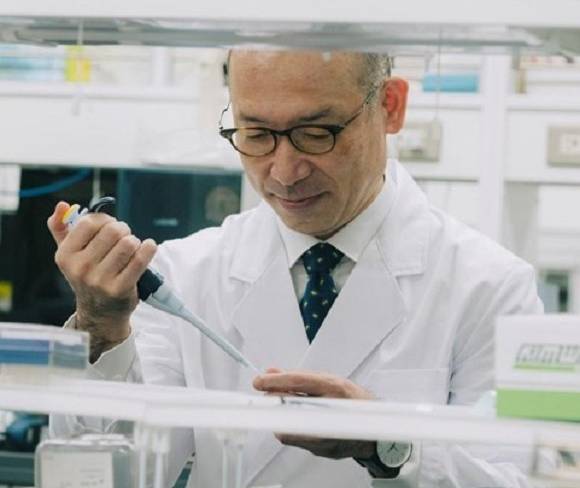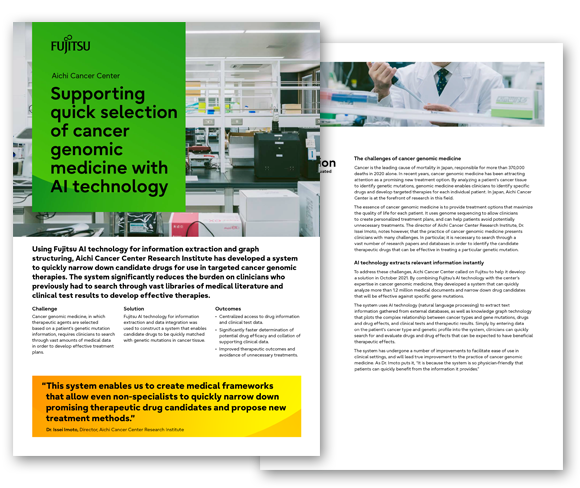Aichi Cancer Center
Supporting quick selection of cancer genomic medicine with AI technology
Using Fujitsu AI technology for information extraction and graph structuring, Aichi Cancer Center Research Institute has developed a system to quickly narrow down candidate drugs for use in targeted cancer genomic therapies. The system significantly reduces the burden on clinicians who previously had to search through vast libraries of medical literature and clinical test results to develop effective therapies.
Challenge
Cancer genomic medicine, in which therapeutic agents are selected based on a patient’s genetic mutation information, requires clinicians to search through vast amounts of medical data in order to develop effective treatment plans.
Solution
Fujitsu AI technology for information extraction and data integration was used to construct a system that enables candidate drugs to be quickly matched with genetic mutations in cancer tissue.
Outcomes
- Centralized access to drug information and clinical test data.
- Significantly faster determination of potential drug efficacy and collation of supporting clinical data.
- Improved therapeutic outcomes and avoidance of unnecessary treatments.
This system enables us to create medical frameworks that allow even non-specialists to quickly narrow down promising therapeutic drug candidates and propose new treatment methods.
Dr. Issei Imoto, Director, Aichi Cancer Center Research Institute

1.2 million
clinical reports evaluated instantly
- Industry: Medical
- Location: Japan
- People: 53
- Customer's website

About the customer
Established in December 1964 in Nagoya, Aichi Prefecture, Aichi Cancer Center was one of the largest and oldest comprehensive cancer centers in Japan. In addition to offering advanced diagnostic treatment, the center performs basic research, trains specialized technicians, and conducts clinical research in genomic diagnostics, genomic treatment, and immunotherapy.
The challenges of cancer genomic medicine
Cancer is the leading cause of mortality in Japan, responsible for more than 370,000 deaths in 2020 alone. In recent years, cancer genomic medicine has been attracting attention as a promising new treatment option. By analyzing a patient’s cancer tissue to identify genetic mutations, genomic medicine enables clinicians to identify specific drugs and develop targeted therapies for each individual patient. In Japan, Aichi Cancer Center is at the forefront of research in this field.
The essence of cancer genomic medicine is to provide treatment options that maximize the quality of life for each patient. It uses genome sequencing to allow clinicians to create personalized treatment plans, and can help patients avoid potentially unnecessary treatments. The director of Aichi Cancer Center Research Institute, Dr. Issei Imoto, notes however, that the practice of cancer genomic medicine presents clinicians with many challenges. In particular, it is necessary to search through a vast number of research papers and databases in order to identify the candidate therapeutic drugs that can be effective in treating a particular genetic mutation.
AI technology extracts relevant information instantly
To address these challenges, Aichi Cancer Center called on Fujitsu to help it develop a solution in October 2021. By combining Fujitsu’s AI technology with the center’s expertise in cancer genomic medicine, they developed a system that can quickly analyze more than 1.2 million medical documents and narrow down drug candidates that will be effective against specific gene mutations.
The system uses AI technology (natural language processing) to extract text information gathered from external databases, as well as knowledge graph technology that plots the complex relationship between cancer types and gene mutations, drug and drug effects, and clinical tests and therapeutic results. Simply by entering data on the patient’s cancer type and genetic profile into the system, clinicians can quickly search for and evaluate drugs and drug effects that can be expected to have beneficial therapeutic effects.
The system has undergone a number of improvements to facilitate ease of use in clinical settings, and will lead true improvement to the practice of cancer genomic medicine. As Dr. Imoto puts it, “It is because the system is so physician-friendly that patients can quickly benefit from the information it provides."
Clinical testing confirms effectiveness and future potential
Clinical tests conducted on a cohort of approximately 450 cancer patients at Aichi Cancer Center have confirmed the system’s effectiveness. The test data was reviewed by a panel of experts who found that the system correctly identified standard therapeutic agents for eight types of genetic mutations, and successfully ranked promising drug candidates by their drug efficacy scores.
“If a quick and accurate decision can be made, it will enable us to select a promising therapeutic drug and also exclude those that are unpromising from the list at the same time,” says Dr. Imoto. “the system enables us to create medical frameworks that allow even non-specialists to quickly narrow down therapeutic drug candidates and propose new treatment methods.”
“In the future, we hope to expand the data sources and article information the system can analyze, and include some of our own original data,” says Dr. Imoto. Aichi Cancer Center Research Institute has developed a number of cultured cancer tissue and cell models and those with partially modified genes, and by adding information on drug efficacy and resistance obtained from these original experimental models it will be possible to evolve the system further. Of course, the ultimate goal is to improve the overall quality of cancer care and provide therapies targeted to meet the needs of each patient. And as the center works to achieve this noble goal, Fujitsu is always on call to lend a hand.
